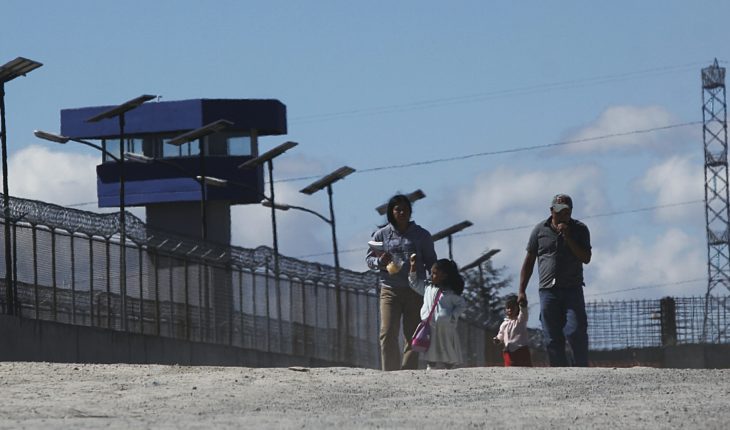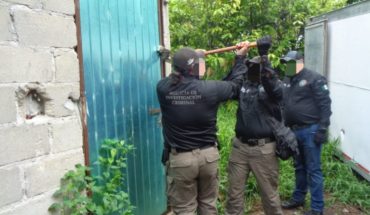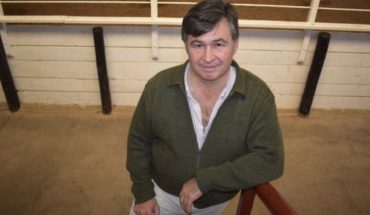Juan de la Cruz spends most of the day lying down. The forces no longer give him to stand for long or sit. Lying on the floor, on a tarp, she tries to keep doing what she loves most: drawing. In the last few days he took care of reflecting in images what he lived and suffered when he was arrested and tortured.
In these drawings John is seen lying on the ground, while a police officer steps on his head in front of his daughter and his wife. In another, John in the middle of a room, sitting in a chair, surrounded by agents and full of blood. In one more, he’s sitting in the same room, bleeding, while he signs some papers.
“That’s how they made me sign the statement in which I self-incriminated myself of a homicide that I didn’t commit. They took me out of my house, beaten and without order of apprehension. They took me to a place where they were torturing me. For days I had electric touches on the intimate parts. They put a bag on my head and then dried chilli or tehuacan on my nose. They beat me up a lot.”
Juan de la Cruz is one of five prisoners in Chiapas who this June 26, International Day of Support for Victims of Torture, meet 105 days on hunger and fast ingess, as a way to demand that their files be reviewed and an investigation for torture , which since the beginning of their processes have been reporting.
The five, -Abraham López Montejo, Germán López Montejo, Adrián Gómez Jiménez and Juan de la Cruz Ruiz, who are at CERSS no5 in San Cristóbal de las Casas, and Marcelino Ruiz Gómez, in prison number 10 of Comitán – accuse that they were arrested without an arrest warrant they made them confess under torture crimes they did not commit, in a practice known as the manufacture of culprits and which several activists and collectives have said are done to reach the quota of detainees or cover up the real culprits.
Read: Chiapas and Oaxaca, states disapproved of in the treatment of indigenous people who are deprived of liberty: study
“We have reviewed the files of two of the prisoners on hunger strike, Juan de la Cruz and Adrián Gómez Jiménez. In both, the appointees recount, first to the public prosecutor and then to the judge, that they tortured them and how they tortured them. That’s there in the files and no one listened to them,” says Rubén Moreno, coordinator of the Advocacy area of the Fray Bartolomé de Las Casas Human Rights Center (Frayba), an organization that runs the legal defense of cases.
The lawyer explains that they have barely managed to review the files of two of the inmates because families must apply and pay to get the copies. “From Adrián’s file are 27 tomes. It was 18 thousand pesos. He doesn’t have a family anymore. His parents and brother are already dead. Between the relatives of the other prisoners and several civil society organizations we had to raise the money.”
With those of the other three: Abraham López Montejo, Germán López Montejo and Marcelino Ruiz Gómez there is an additional problem: their files are in a different penalty to where they purge their conviction. “They have to move them and a series of paperwork, as well as getting to pay for the copies, which has delayed that we can have them,” Moreno explains.
But of Juan and Adrián, he says, “we are clear that torture denounced it from the beginning and it was not investigated. Moreover, John’s file is supposed to have been thoroughly reviewed by the authorities, because he was at the Reconciliation Bureau and we do not understand how they did not see the allegation of torture.”
This table is an interinstitutional mechanism involving the governance of the state, the judiciary and human rights. It was created in 2009, after a hunger strike by several prisoners for irregularities in their process and detention. The agency’s goal is to help release insrs with similar situations.
Dialogue without results
Chiapas government officials, including Government Secretary Ismael Brito Mazariegos, sat down with relatives of prisoners who decided to start the hunger strike on 15 March to demand review of their files and allegations of torture.
You may be interested: Chiapas prisoners on hunger strike since last March start to get sick
But relatives ended up reporting that they were only being spinning around to attend meetings where nothing was concreted. This has been the day spent in which prisoners have been fasting and on hunger strike, and for those who have already begun to get sick.
Two of them have already had to be transferred to the hospital and one more is now in the prison of the prison. Adrián Gómez, already had two admissions to a hospital, the first on May 25, the second was on June 12, for a severe urinary tract infection that does not give way.
Marcelino Ruiz was admitted on May 29 due to severe pain in the abdomen, on the right side, through the rib area. “They took him to a hospital in Comitán, but they had him there for a while, just had a stomach ultrasound and returned him to the penitentiary. They told him he’s got nothing. But they didn’t want to show you the results of the study. They only give Naproxeno to soothe the pain,” his brother Facundo Ruiz reports.
On June 23 in the afternoon, Germán began to feel a general discomfort in the body that intensified. By 12:00 a.m. in the 24th, he already had fever, diarrhea, leg cramps, stomach pain, vomiting and dizziness.
Despite this symptom scan, he has not been transferred to a hospital. He’s being treated by the criminal’s doctor in the infirmary. “They just put serum and antibiotics in it. They told him he has an infection, but they don’t tell him where,” juan de la Cruz says, in an interview from the prison.
Read also: #LiberarlasEsJusticia: More than 3,000 women are imprisoned in Mexico for misdemeanors against health
Everyone is already having health problems, one of the members of the No Estamos Todos Working Group denounces, an organization that also accompanies the fight of prisoners. “They’ve already lost 10% of their muscle mass, that’s because their body is consuming itself. When that happens, the first thing that is affected is the urinary tract and liver, which, when it is wrong, infects the blood and other organs. That’s why infections so strong.”
John himself says that he already feels burning when he urinates. “I haven’t told the criminal doctor to check me out. I’ve been drinking a lot of chamomile tea and plenty of water, up to five litres a day. But I’m already in a lot of trouble. I didn’t say anything because they don’t take good care of us, they don’t care.”
Relatives of prisoners and members of the Frayba and the Working Group have indicated that the government will be responsible for what happens. “They are not willing to give up the hunger strike. They know they’re innocent and they’re fighting for their freedom. We families are very worried. It’s hard to see them sick, so weak. But we support them. On Monday we will fast in front of the Court of Justice of Chiapas, see if they listen to us,” says Susana de la Cruz, John’s sister.
The woman recounts that the last time they met with someone from the government was with Fernando Pérez Robles, director of human rights in the Chiapas government. “But he told us the same old thing, that the processes of the boys had to follow their normal course and that took time. He promised us that we would meet two or three days later to see progress and that meeting has not been held. The Frayba are looking for him and he leaves them in the eye.”
Closed cases for the government
Questioned by Animal Político about the situation of Chiapas inmates on hunger strike, Brito Mazariegos, the government sectarian, noted that of the prisoners who started the fighting since March 15, two had already been released.
“I am informed that for others it is impossible to enter into a release (sic) because of the type of crimes and the evidence in the files … do you agree that with a person who is fully proven in a file for his guilt, for we cannot talk about the iberation?… but we’re going to ask the judiciary again for a review.”
Read: Villages of Aldama, Chiapas, under attack by territorial conflict and without action by authorities
AP: And on the allegations that they were made to testify under torture, has an investigation already been done, it has already been proven that they are lying, that they were not tortured?
IB: It resulted in the release of two people. As for the others, the judiciary has made a fact-telling, but, as I offered you, we can ask you to thoroughly review the files, even though that already did.
The Frayba’s lawyer, Ruben Moreno, says only one of the prisoners who started the hunger strike has been released and it was for good behavior. He also notes that the Chiapas government cannot claim that prisoners on hunger strike are guilty because investigations continue.
“Only Juan and Adrian have sentences, the other three don’t, so you can’t talk about being guilty. I can’t believe the government doesn’t know that. And in the case of the sentenced, Adrián promoted a review appeal that is ongoing, and John is supposed to be a beneficiary of the Reconciliation Bureau, so his case is not closed.”
In addition, Moreno adds, “in April we filed the allegations of torture before the Prosecutor’s Office Against Torture in the State of Chiapas. They barely took the testimony of the prisoners. There have to be several errands, including psychological expertise. That’s ongoing. If torture is determined, the processes will be dropped. How can you say that those who are still in jail are because it is already proven that they are guilty, they cannot say that.”
What we do in Animal Político requires professional journalists, teamwork, dialogue with readers and something very important: independence. You can help us keep going. Be part of the team.
Subscribe to Animal Politician, receive benefits and support independent journalism.#YoSoyAnimal
translated from Spanish: Prisoners in Chiapas meet 105 days on hunger strike
June 26, 2019 |





